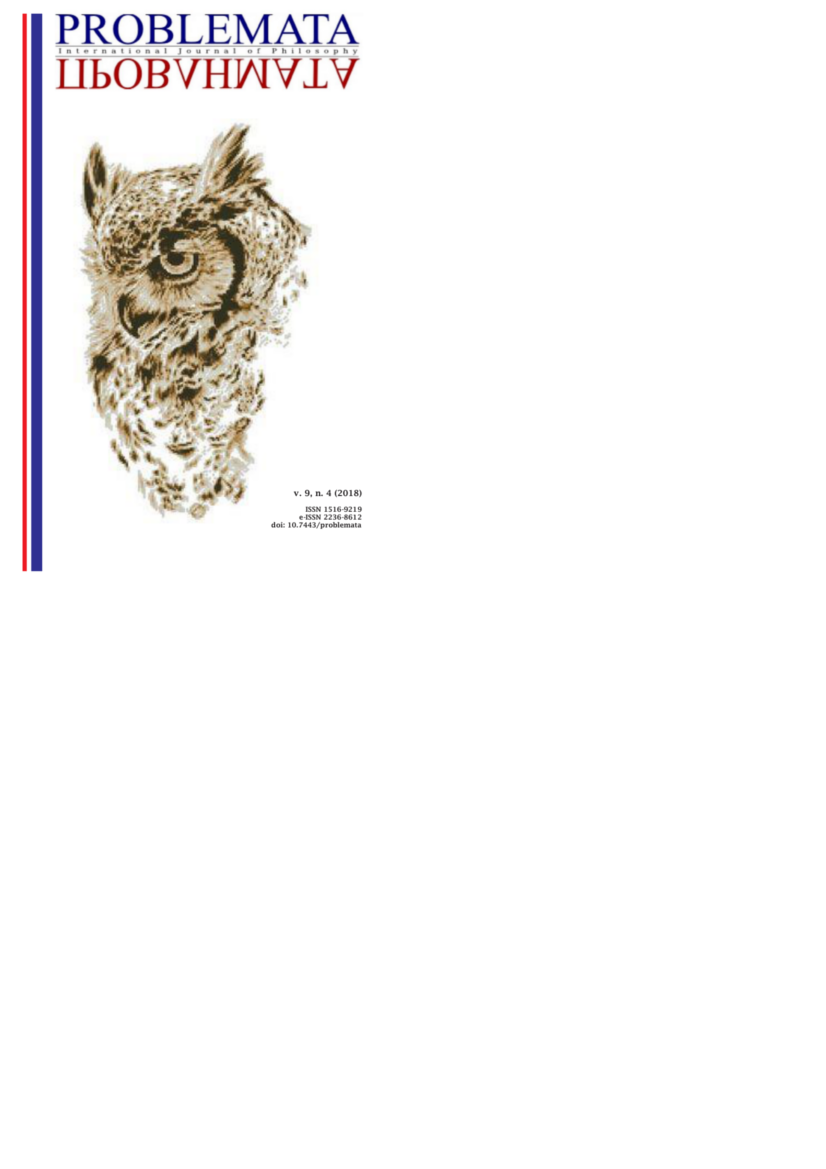THE POPULAR FESTIVITY IN THE REPUBLIC IN THE PERSPECTIVE OF JEAN-JACQUES ROUSSEAU
DOI:
https://doi.org/10.7443/problemata.v9i4.39959Keywords:
Comedy Theater, Popular Festival, Republic, Rousseau.Abstract
In presenting, in his Letter to D’Alembert, his disagreement with the proposal for the creation of a Comedy Theater in Geneva, Rousseau, concurrently, presents an exaltation of the popular festival. To consider the conception of “popular festival”, in Rousseauian thought, and defending the hypothesis that it is possible to understand how the popular festival can contribute towards the longevity of the republic, based on an analysis of certain aspects of the Letter to D’Alembert and the Considerations on the Government of Poland, this article will concentrate on four points: the first, an examination of the proposal, presented by D’Alembert, of a Comedy Theatre for Geneva, second, a careful consideration of Rousseau’s objection to D’Alembert’s proposal; third, an analysis of the reasons why the Genovese author advocates that the popular festival is the most appropriate spectacle for the republic of Geneva; and fourth, (referring to the text on Poland) facing the following question: how can the popular festival contribute to the preservation of the Republic?
Downloads
References
KANT, Immanuel. Gesammelte Schriften. Hrsg.: Bd. 1-22 Preussische Akademie der Wissenschaften, Bd. 23 Deutsche Akademie der Wissenschaften zu Berlin, ab Bd. 24 Akademie der Wissenschaften zu Göttingen. Berlin 1900ff.
______. A Religião nos Limites da Simples Razão. Trad. Artur Morão. Lisboa: Edições 70, 1992.
______. Antropologia de um Ponto de vista Pragmático. Trad. Clélia Aparecida Martins. São Paulo: Iluminuras, 2006b.
______. Anúncio do término próximo de um tratado para a paz perpétua na filosofia. Trad. Valerio Rohden et al. Ethic@. V. 5, n. 2, 2006a, p. 221-233.
______. Crítica da Faculdade do Juízo. Trad. António Marques e Valerio Rohden. Segunda ed. Rio de Janeiro: Forence Universitária, 2010.
______. Crítica da Razão Prática. Edição bilíngue. Trad. Valerio Rohden. São Paulo: Martins Fontes, 2003.
______. Crítica da Razão Pura. Trad. Fernando Costa Matos. Petrópolis, RJ: Editora Vozes, Bragança Paulista, SP: Editora Universitária São Francisco, 2012.
______. Crítica da Razão Pura. Tradução Valerio Rohden e Udo Baldur Moosburger. Coleção Os Pensadores. São Paulo: Editora Nova Cultural, 1999.
______. Do génio. Apresentação e tradução de Fernando M. F. Silva. Estudos Kantianos, Marília, v. 3, n. 2, Jul./Dez., 2015 p. 211-232.
______. Formas e princípios do mundo sensível e do mundo inteligível. Trad. Paulo R. Licht dos Santos. In. KANT, Immanuel. Escritos pré-críticos. São Paulo: Editora da UNESP, 2005, p. 219 - 282.
______. Metafísica dos costumes. Trad. [primeira parte] Clélia Aparecida Martins; [segunda parte] Bruno Nadai, Diego Kosbiau e Monique Hulshof. Petrópolis, RJ: Vozes; Bragança Paulista, SP: Editora Universitária São Francisco, 2013.
______. Metaphysical foundations of natural science. Trans. and ed. by Michael Friedman. Cambridge: Cambridge University Press, 2004.
______. Observações referentes a Sobre o órgão da alma. Trad. e Notas de Zeljko Loparic. In. Kant e-prints. Campinas: Universidade Estadual de Campinas, Centro de Lógica, Epistemologia e História da Ciência, Vol. 2, n. 7, 2003.
______. Primeira Introdução à Crítica do Juízo. Trad. Rubens Rodrigues Torres Filho. Coleção Os Pensadores. Volume XXV. Abril Cultural, 1974, p. 257 - 297.
______. Realidade e existência: lições de metafísica. Trad. Armando Rigobello. São Paulo: Ed. Paulus, 2002.
______. Sonhos de um visionário explicados por sonhos da metafísica. Trad. Joãosinho Beckenkamp. In. KANT, Immanuel. Escritos pré-críticos. São Paulo: Editora da UNESP, 2005a, p. 141 – 218.
BECKENKAMP, Joãosinho. Tinha Kant um conceito de espírito? O que nos faz pensar, [S.l.], v. 1, n. 32, dec. 2012.
DÖRFLINGER, Bernd. A ideia de Kant de um sentimento intuitivo no contexto de sua teoria do organismo. In: MARQUES, Ubirajara Rancan de Azevedo (Org.). Kant e a biologia. São Paulo: Editora Barcarolla, 2012.
FALDUTO, Antonino. The Faculties of the Human Mind and the Case of Moral Feeling in Kant’s Philosophy. Berlín/Boston, De Gruyter (Kantstudien- Ergänzungshefte), 2014.
GIANNOTTI, José Arthur. Kant e o espaço da história universal. In: KANT, I. TERRA, Ricardo (org.). Ideia de uma história universal de um ponto de vista cosmopolita. 3ª ed. São Paulo: Editora WMF Martins Fontes, 2011.
LEBRUN, Gérard. Kant e o Fim da Metafísica. 2ª Ed. São Paulo: Martins Fontes, 2002.
MARTINS, Clélia Aparecida. Organismo no Opus Postumum. In: MARQUES, Ubirajara Rancan de Azevedo (Org.). Kant e a biologia. São Paulo: Editora Barcarolla, 2012.
ROHDEN, Valério. A função transcendental do Gemüt na Crítica da razão pura. Kriterion vol.50. Belo Horizonte, nº 119, Jun./2009.
ROHDEN, Valerio. Tradução em perspectiva: sobre algumas questões e dificuldades na tradução da Crítica da faculdade do juízo. In: ______ (Org.) 200 Anos da Crítica da Faculdade do Juízo de Kant, 1790 – 1990. Porto Alegre: Ed. da Universidade/UFRGS, Instituto Goethe/ICBA, 1992.
SANTOS, Leonel Ribeiro dos. A formação do pensamento biológico de Kant. In: MARQUES, Ubirajara Rancan de Azevedo (Org.). Kant e a biologia. São Paulo: Editora Barcarolla, 2012.
VAIHINGER, Hans. Kommentar zu Kants Kritik der reinen Vernunft. Stuttgart: Union Deutsche Verlagsgesellschaft, 1922.
Downloads
Additional Files
Published
Issue
Section
License
Authors who publish with this journal agree to the following terms:
- Authors retain copyright and grant the journal right of first publication with the work simultaneously licensed under a Creative Commons Attribution License that allows others to share the work with an acknowledgement of the work's authorship and initial publication in this journal.
- Authors are able to enter into separate, additional contractual arrangements for the non-exclusive distribution of the journal's published version of the work (e.g., post it to an institutional repository or publish it in a book), with an acknowledgement of its initial publication in this journal.
-
- Authors are permitted and encouraged to post their work online (e.g., in institutional repositories or on their website) prior to and during the submission process, as it can lead to productive exchanges, as well as earlier and greater citation of published work (See The Effect of Open Access).





